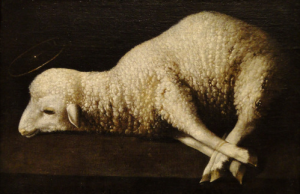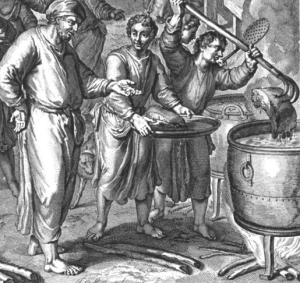How OT Sacrifices Saved
What happens during a sacrifice? How do sacrifices work? What was killing an animal in the temple supposed accomplish?
 Malachi 1:6-2:9 explains the logical underpinning of temple sacrifices. Basically, the priest’s defective sacrifices failed to honor God. The priests’ unclean animals have shown contempt upon God’s table. This despises God.
Malachi 1:6-2:9 explains the logical underpinning of temple sacrifices. Basically, the priest’s defective sacrifices failed to honor God. The priests’ unclean animals have shown contempt upon God’s table. This despises God.
Animal sacrifices are a gift to honor God. This idea appears in 1:8—“Try presenting that to your governor, will he be pleased with you or show you favor?” Nobody in their right mind would take a dirty, used gift to their governor. One, their social conscious would hardly allow it. And two, the governor would scold and humiliate them for such an insult. Yet, that is exactly what Israel is doing—presenting lame gifts to God. And God is much more than just a governor—“I am a great King, says the LORD of hosts, and my name will be feared among the nations.”
The purpose of the sacrifices was to honor God. This fact appears 4 times in the passage: Mal 1:6; Mal 1:11; Mal 2:2; Mal 2:5 (remember, these verses about specifically about defective sacrifices, not general sin.)
Sacrifices affirm relationships. They are symbols of loyalty and praise to a patron/protector. The animals are gifts that communicate respect and deference. As gifts, sacrifices honor God and affirm the relationship. David deSilva explains, “Unintentional sins against God’s honor could be remedied with sacrifices. Just as gifts could forestall the revenge of those who had been unintentionally dishonored (or satisfy the honor of the affronted one by presenting a display of repentance in which one acknowledges the true worth and “weight” of the offended party, as in Gen 32:19-20; 33:8-11), so animal sacrifices provided atonement for unintentional affronts against God’s honor (Lev 4:2-3; 5:5-6)” (deSilva, IVPDOTP, p. 435, emphasis added). This is how OT sacrifices saved.
But sadly, the priests’ contemptible sacrifices despise and profane God’s name (Mal 1:6-7; 1:12). And for such dishonoring actions, God would shame the priests. God would curse the benedictions they pronounce (2:2), curse their offspring, spread the animal’s dung all over their face (2:3), and make them “despised and abased before all the people” (2:9). Their shaming consequences of defective sacrifices is another indication of their original purpose—to honor God.
Two other OT narratives also indicate the sacrificial system was designed to honor God.
Phinehas—Zealous for God’s Honor
In Numbers 25, Phinehas kills the Israelites sleeping with Midianites. For that, God covenants that Phinehas family will be Israel’s priests becuase he was zealous for God’s honor.
The LORD said to Moses, “Phinehas son of Eleazar, the son of Aaron, the priest, has turned my anger away from the Israelites. Since he was as zealous for my honor among them as I am, I did not put an end to them in my zeal. Therefore tell him I am making my covenant of peace with him. He and his descendants will have a covenant of a lasting priesthood, because he was zealous for the honor of his God and made atonement for the Israelites.” (Num. 25:10-13)
Zeal for God’s honor uniquely qualified Phinehas to oversee the sacrifices—an indication the priestly sacrifices were foremost about honoring God.
Eli’s Sons—Stealing God’s Honor
 In 1 Samuel 2, Eli’s family is stealing the best cuts of meat from the sacrifices. For that, they are accused five times of scorning/dishonoring God. The text says,
In 1 Samuel 2, Eli’s family is stealing the best cuts of meat from the sacrifices. For that, they are accused five times of scorning/dishonoring God. The text says,
“Eli’s sons were scoundrels; they had no regard for the LORD or for the duties of the priests to the people. … This sin of the young men was very great in the LORD’s sight, for they were treating the LORD’s offering with contempt. … Why do you scorn my sacrifice and offering that I prescribed for my dwelling? Why do you honor your sons more than me by fattening yourselves on the choice parts of every offering made by my people Israel? … Those who honor me I will honor, but those who despise me will be disdained. (1 Sam. 2:12-13,17, 29-30).
As in Malachi 1-2, we see the purpose of the sacrifices was to honor God. The story in 1 Sam 2 only makes sense when put in that framework.
Conclusions
The OT sacrifices surely had other effects as well. The sacrificial system also ensured purity/holiness (Lev 14) and atoned for sin (Lev 19:22). Yet these functions, I believe, are compatible with (not distinct form) sacrifice’s ultimate function of gifting honor to God.
The honor-shame realities of OT sacrifices should inform our interpretation of “sacrifice” imagery in the NT. Looking into the New Covenant era, two questions arise:
- Exactly how did Jesus’ sacrificial death bring honor to God?
- What does it mean for believers to be “living sacrifices?”
______________
Read more in this series, “Honoring Theology“:

I’ve been thinking about Romans 12:1ff a lot lately, so relating your comments to us being living sacrifices was in the back of my mind the whole time I was reading your post. I take Romans 12:3-15:13 to be Paul’s explication of our “reasonable service” (NET) or “true and proper worship” (NIV). It is enlightening to read these chapters now, adding “…because this honors God” to each command. For example:
“Do not think of yourself more highly than you ought, but rather think of yourself with sober judgment [because this honors God].”
“Abhor what is evil, cling to what is good [because this honors God].”
“Rejoice in hope, endure in suffering, persist in prayer [because this honors God].”
I’m suspecting now that Paul’s original readers would have made that connection instinctively, having been steeped in the sacrifice-gives-honor-to-God concept for their entire lives.
Good point Earl. The point is implicit as you suspect, but also explicit at several points. Paul refers to honor several times in his ethical instruction to the Romans.
Romans 12:10 love one another with mutual affection; outdo one another in showing honor.
Romans 13:7 Pay to all what is due them—taxes to whom taxes are due, revenue to whom revenue is due, respect to whom respect is due, honor to whom honor is due.
Romans 13:13 let us live honorably as in the day
Romans 14:6 Those who observe the day, observe it in honor of the Lord. Also those who eat, eat in honor of the Lord, since they give thanks to God; while those who abstain, abstain in honor of the Lord and give thanks to God.
Just read Isa 43:23 this morning. Sacrifices=honoring God
“You have not brought me your sheep for burnt offerings,
or honored me with your sacrifices.”
Great article! I came to similar conclusions but through different sources. One question, you referenced “deSilva, IVPDOTP, p. 435”. Is this the IVP Dictionary of the Old Testament: Prophets?
Thanks
Ryan, that is encouraging to hear. I’m curious to know, what sources led you to that conclusion? Any particular OT verses?
That is a reference to the IVP Dict of the OT:Pentateuch, I believe it’s the article titled “Honor & Shame” by deSilva.
Thanks for the reference!!
It started with seeing some inconsistencies between the theology I grew up with (Jesus was the final sacrifice) and the narrative in Acts 21 where Paul attempts to purify himself from a Nazarite vow along with 4 others at the behest of the Jerusalem council, which would have required him to offer the whole burnt offering, the sin offering, and the peace offering. Clearly Paul and James saw no contradiction between Jesus’ work on the cross and continuing to offer sacrifices.
I started with Jacob Milgrom’s Continental Commentary on Leviticus in which he shows clearly that the ‘chatta’t’ sacrifice should be translated as “purification offering” and not “sin offering” based upon the Hebrew text. I have also read as many other scholarly commentaries on Leviticus as I could find and developed an understanding that the work of Christ on the cross served a different function from the regular sacrifices…his death served the function of the special offerings of Passover, Day of Atonement goats, and the Red Heifer.
I then began to study honor and shame cultures with many of the books that you have recommended plus many others (I am currently writing my thesis on the honor and shame in the Torah for my Masters in Biblical Studies degree). When I went back and reread Malachi 1 and 2, everything clicked for me and I began to apply the principles of honor and shame culture to what I had learned about Leviticus 1-5 and it really opened up my understanding.
The only commentary on Leviticus that I have found that really brought support to my understanding is Jay Sklar’s Tyndale OT Commentary on Leviticus, but he doesn’t really go too much in depth on the subject. It is a subject that I have considered continuing to research and write a book on the matter. I did record a 5 hour video series on the subject which has been well received by the people I presented it to. If you are interested, I can send you the video files to review and take into consideration.
“Those who bring thanksgiving as their sacrifice honor me.” (Psalm 50:23)
When Jews returned to Jerusalem after the exile, God tells them to rebuild the temple “so that I may take pleasure in it and be honored” (Hag 1:8).
The purpose of restoring the temple so Israel could offer worship/sacrifices to God was to honor him.
Since writing this post, I keep finding OT verses that affirm this motif of “sacrifices=honor”
Ascribe to the Lord the glory due his name;
bring an offering and come into his courts. (Psalm 96:8)
Another verse about worship honoring God.
““ ‘Make an altar of earth for me and sacrifice on it your burnt offerings and fellowship offerings, your sheep and goats and your cattle. Wherever I cause my name to be honored, I will come to you and bless you.”
Ex 20:14